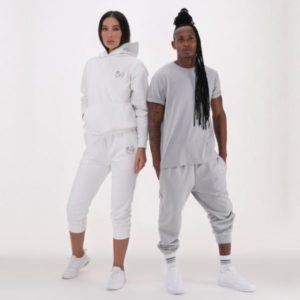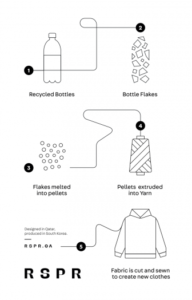The theme of sustainability is among the top of designers’ talks. Many people would like to switch to organic fabrics. What eco-friendly tissues are there?
Many people have heard of hemp, but besides it, there is already an incredible amount of completely biodegradable materials. We’ve found for you WWD material guide.
Next-gen materials are receiving a lot of buzz. Commonly, next-gen materials take inspiration from nature but are tailored with modern technologies for multi-industry use, be it in apparel or medical fields. Material can be grown to shape like fungi or fermented to appear as silk spun by spiders.
Here is a brief list:
- AirCarbon is a material created from carbon from air.
- AirMycelium is a material from the mycelium of mushrooms.
- B-Silk is a replacement for silicone and keratin in creams and shampoos.
- BioFiber is made from food crop residues. It replaces jersey.
- BioSteel is a spider silk-based material.
- C-Fiber is a mixture of eucalyptus and seaweed pulp from Pangaia.
- Circulose-fiber obtained from the chemical processing of 100% cotton fabric.
- Desserto is cactus leather.
- Econyl is recycled nylon. Attention: some activists call its production greenwashing. Econyl / nylon / polyester are made from recycled plastic: textiles made from recycled plastic are on the rise, and often manufacturers use recycled plastic bottles or fishing nets. Although using a closed loop manufacturing process to help reuse the chemicals in the production is beneficial, every time you wash these products, tiny microplastics are being released straight into the water. Amanda Rushforth from Azraq NGO advises washing them in a Guppyfriend washing bag to help reduce this.
- Flocus is a material made from a blend of cottonwood fibers (Kapok tree).
- Flwrdwn is a fluff made from wildflowers and biopolymers.
- Frut is a cotton alternative made from pineapple and bamboo leaves.
- Infinna is a fiber obtained from textile waste.
- Inner Mettle Milk is a fabric made from milk residues.
- Koba is fur made from recycled polyester.
- Lyocell is biodegradable rayon.
- Malai is leather made from coconut milk.
- Mirum is leather made from cork, coconut, rubber, and vegetable oil.
- MuSkin is a material from the wild fungus parasite Phellinus Ellipsoideus.
- Mylo-skin from mushroom mycelium.
- Nativa wool fiber.
- Nullarbor is a microbial cellulose fiber grown in 10 days.
- Orange Fiber-fabric made from citrus pulp.
- Piñatex is pineapple leaf leather.
- Q-Nova is recycled Nylon & Elastane.
- R-TWO is a textile made from cotton and recycled polyester.
- Reishi is a skin made from mushroom mycelium.
- Repreve is a fiber from plastic bottles.
- Roica is a recycled Elastane.
- Samatoa is a lotus flower microfiber.
- SeaCell is lyocell from seaweed.
- Sertex is leather made of corn.
- Sorona is an alternative to corn spandex.
- Spinnova is a biodegradable alternative to cotton made from wood.
- Vegea-leather from a grape cake.
- Yeast-based Zoa Skin.

Waste to wearables: this fashion line makes clothes out of plastic bottles
Ever thought about wearing clothes made out of recyclable plastic? Then you might keep an eye for the unique environmentally-friendly brand we’ve found for you. Doha News writes on this topic.
As Qatar marks its Sustainability Week, a local-based fashion brand decided to jump on the curve and create its first-ever collection made entirely from recyclable plastic bottles.
RSPR, Latin for breath, has taken a unique step towards becoming an eco-friendly fashion brand by launching an entire athleisure wear line made solely from recycled plastic bottles and antimicrobial fabric.

Although this green initiative has been taking the world by storm in recent months, the homegrown business has become the first of its kind to pioneer this particular eco-conscious material in fashion in Qatar.
The revolutionary brand uses advanced sustainable processes for its clothing collection to “strive for a better tomorrow and a world where plastic waste is eradicated.” This falls in line with RSPR’s core belief and understanding of the importance of preserving the environment and raising awareness about making earth-friendly choices.
“When I realised that there is technology available to us to make clothing that would help to keep plastic out of landfill sites, I knew that’s what I wanted for RSPR,” said Rina Saleh, founder and designer of RSPR.
“I believe, given the state of our planet and its grim future, it is our responsibility as businesses and as individuals to make eco-conscious choices whenever and wherever possible. Every little bit counts, and we all need to pitch in,” she added.
The line is made using antimicrobial material, renowned for killing the bacteria it comes into contact with. Aside from its contribution to less plastic, the fabric also lasts longer than the normal ones and needs fewer washes, reducing waste and general wear and tear.
“I was determined to work with my team and take our fabric to the next level,” Saleh continued. “I wanted to make it extremely soft and add the antimicrobial element to it, especially to reflect the pandemic landscape we are living through.”
A unisex sweats outfit consisting of sweats, hoodie and t-shirt, requires the recycling of a total of 124 plastic bottles. For the women’s bra, t-shirt and socks, 84 plastic bottles are recycled; as for the men’s gym kit consisting of leggings, shorts, t-shirt and socks, this would equal 106 recycled plastic bottles.
Depending on the end product, the recycled polyester is mixed with cotton and/or spandex which is softened using specific eco-friendly softeners and then treated with an antimicrobial treatment, Saleh notes.
“Most softeners are bad for the environment which is important to note as they are used on almost all clothing you buy and they are awful for the eco-system,” she added.
The fashion brand also packages all their orders using biodegradable material, eliminating even more plastic waste.
While the concept, brand and designs are created in Qatar, all clothes are produced in South Korea, a global leader in antimicrobial fabric, before then being shipped to Qatar for sale.
“I chose to work there as they are leaders in quality production, recycled materials and antimicrobial fabrics. They were also willing to work with me to experiment with new materials and fabric compositions as the combination of both fabric made from recycled plastic and the antimicrobial treatment hadn’t been done before, at least not that we know of,” Saleh said.
For RSPR, the target isn’t just eco-friendly clothes.
“My goal was to create an eco-friendly line from A-Z- not just to use one ingredient touted as eco-friendly and then market the brand as such- that created many challenges. How are the workers at the mills treated? What softeners are we using? Are any of the ingredients on the fabrics harmful to the environment when they are washed and enter our water system? And of course, how much would it cost and would people be willing to pay that price for the product?
” In short, everything becomes more difficult when you make a real commitment to eco-friendly production but hopefully, with time, more eco-friendly business and consumer support, it will become the norm and it won’t be as challenging,” she added.
The collection can be found at Galeries Lafayette and Harvey Nichols in Qatar.
The brand is also looking to expand and provide international shipping soon through its website.
***
We’ve collected for you ten habits that will benefit the planet now! Looks interesting? Read about them here!



